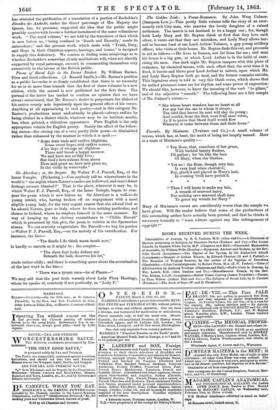Sir Aberdour ; or, the Sceptic. By Walter P. J.
Purcell, Esq., of the Inner Temple. (Pickering.)—Can anybody tell us whereabouts in the -world is "the region where Nature's smiles are hollowest, and man's finest feelings soonest blunted?" That is the place, wherever it may be, in which Walter P. J. Purcell, Esq., of the Inner Temple, began to com- pose the poem which is now before us_ Sir Aberdour is a well-to-do young infidel, who, having broken off an engagement with a most eligible young lady, for the very cogent reason that she adored God as 'he adored Nature, goes to Italy, where he does nothing particular, and -thence to Ireland, where he employs himself in the same manner. By way a keeping up the obvious resemblance to " Childe Harold" which is presented by this plot, the poem is written in the Spenserian
stanza. We can scarcely congratulate Mr. Purcell—we beg his pardon —Walter P. J. Purcell, Esq.,—on the melody of his versification. For instance, the line- " The fiends I do think mean insult now," is hardly so smooth as it might be ; the couplet- " The slave that looks defiant not Beneath the lash, deserves his lot," reads rather oddly ; and there is something queer about the accentuation of the last word in the line- " There was a tyrant once—he of Phero3—"
We may add that the poet feels warmly about Lady Flora Hastings, whom he speaks of, concisely if not poetically, as "Lady F."






























 Previous page
Previous page